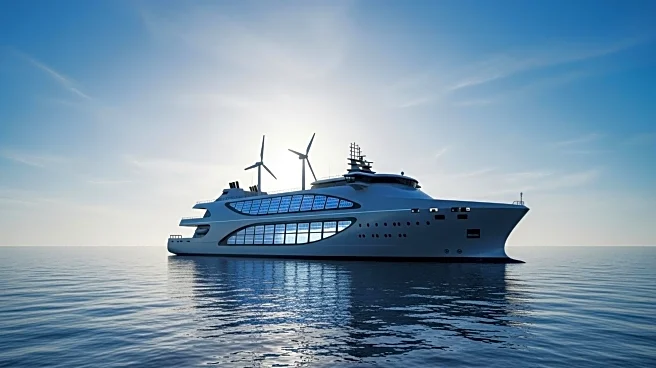What is the story about?
What's Happening?
The International Maritime Organization (IMO) is intensifying its efforts to prepare seafarers for the shipping industry's transition to alternative fuels. This initiative is part of the IMO's revised strategy to reduce greenhouse gas emissions from ships. The organization has issued interim guidelines for training seafarers on ships using alternative fuels and new technologies. These guidelines provide an international framework for developing and approving training programs for seafarers on ships powered by zero or near-zero emission fuels. The guidelines cover various fuel types, including methyl/ethyl alcohol, ammonia, hydrogen, LPG, battery-powered ships, and fuel cells. The IMO's Sub-Committee on Human Element, Training and Watchkeeping will review these guidelines in February 2026, with the aim of establishing mandatory training requirements under the revised 1978 STCW Convention Code.
Why It's Important?
The IMO's initiative is crucial for the maritime industry's shift towards sustainable practices. By ensuring that seafarers are adequately trained to handle ships powered by alternative fuels, the organization is addressing safety concerns and promoting environmental responsibility. This move is expected to support the industry's decarbonization efforts, aligning with global climate goals. The training guidelines will help standardize practices across member states, facilitating a smoother transition to new technologies. As the industry adapts to these changes, stakeholders, including shipping companies and environmental groups, stand to benefit from reduced emissions and improved operational efficiency.
What's Next?
The IMO's Sub-Committee on Human Element, Training and Watchkeeping will consider the interim training guidelines in February 2026. This review is expected to lead to the establishment of mandatory training requirements for seafarers under the revised STCW Convention Code. The ongoing development of fuel- and technology-specific training materials will continue to evolve, ensuring that seafarers are equipped to handle the latest advancements in maritime technology. Member states are likely to increase their collaboration with the IMO to implement these guidelines effectively, contributing to the global effort to reduce maritime emissions.
Beyond the Headlines
The IMO's focus on training seafarers for alternative fuel ships highlights the broader shift towards sustainable maritime practices. This initiative not only addresses environmental concerns but also emphasizes the importance of human capital in the industry's transition. By investing in seafarer training, the IMO is fostering a culture of safety and innovation, which could lead to long-term improvements in maritime operations. The collaboration with the World Maritime University and other stakeholders underscores the need for a collective approach to tackling climate change and advancing technological progress in the shipping sector.
















